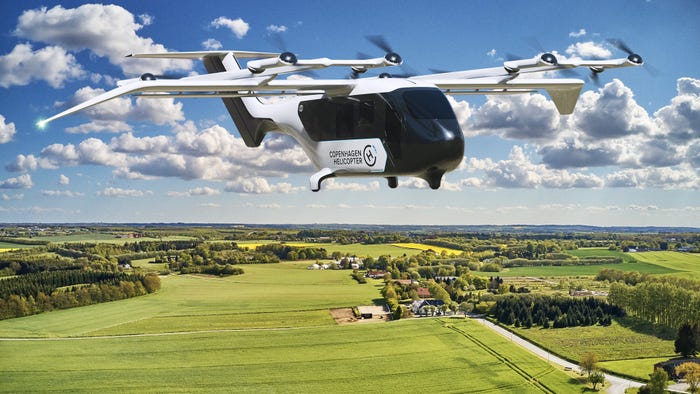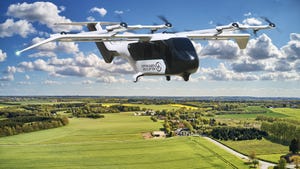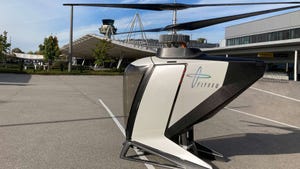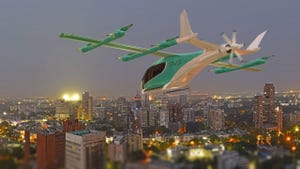Flying Taxis Planned for South CarolinaFlying Taxis Planned for South Carolina
Three companies plan to develop use cases for flying vehicle originating from Greenville Downtown Airport

Japanese eVTOL (electric vertical takeoff and landing) vehicle maker SkyDrive, SAI Flight and Greenville Downtown Airport have agreed to advance air-cargo, air-taxi and emergency service use cases for flying vehicles in South Carolina.
SAI Flight is a large private jet charter company in South Carolina and Greenville Downtown Airport is the state’s busiest general aviation hub.
The three companies plan to develop use cases for the eVTOL, originating from Greenville Downtown Airport with support from the Greenville City Economic Development and the Greenville Area Development corporations.
“This partnership marks a significant milestone in our efforts to drive business growth in South Carolina, where we have been actively expanding since 2023,” said Tomohiro Fukuzawa, CEO of SkyDrive. “It presents a valuable opportunity to accelerate our expansion and bring advanced air mobility solutions to the region. We are deeply grateful to Greenville Downtown Airport and SAI Flight for their support and collaboration.”
One of the tasks would be to design practical routes, such as to the city center and the Greenville-Spartanburg International Airport, to enhance travel options.
SAI Flight also placed a pre-order for 10 of the SkyDrive electric aerial vehicles (EAV).
For more flying vehicle and other embedded tech news subscribe to our free newsletter!
SkyDrive also recently signed a strategic alliance with F&E Aircraft Maintenance (FEAM Aero) for the maintenance, support and scalability of its eVTOLs nationally.
SkyDrive last year set up a local subsidiary in the U.S. and the deal with FEAM Aero in Miami is likely to help grow that operation. FEAM Aero supports more than 130,000 flights annually, servicing major airlines, cargo carriers, regional airlines and private operators.
SkyDrive is collaborating with FEAM Aero and other U.S. partners “to develop practical use cases and tailor its offerings based on the current, real-world state of the advanced air mobility (AAM) industry,” according to the company.
The partnership aims to focus on routes from regional airports, which are expected to soon receive regulatory approvals from the Federal Aviation Administration (FAA).
Adding FEAM Aero's maintenance, retrofitting and operational services, the partners plan to incorporate more eVTOL services into the current aviation infrastructure.
SkyDrive recently announced it was turning to artificial intelligence (AI) to aid in the design of its flying vehicles.
SkyDrive partnered with Braid Technologies to use AI to generate thousands of design patterns to fine-tune the structure of its EAV.
Scientists, engineers and designers at the startup use AI, physics and mathematics to automatically discover high performance advanced engineering designs.
SkyDrive was established in 2018 and conducted its first crewed flight test in Japan in 2019, so the project is to potentially enhance the vehicle, which is getting closer to deployment.
For example, SkyDrive and subway operator Osaka Metro agreed to consider using eVTOL vehicles in the Osaka area.
SkyDrive and Osaka Metro are looking at how to use EAVs in practical applications in Japan, including vertiport operations for takeoffs and landings.
Osaka Metro, an investor in SkyDrive, operates eight subway lines and a driverless tram and carries more than 2 million passengers a day.
The subway operator already was integrating different subways, buses and taxis in the Osaka area and was selected as the operator of a vertiport outside the Expo site in Osaka.
The FAA recently accepted a type certification application from SkyDrive, submitted via Japan’s Civil Aviation Bureau (JCAB).
SkyDrive aims to obtain FAA type certification along with its expected JCAB type certification in 2026 or later.
SkyDrive also agreed to sell five of its three-seat flying vehicles to a private charter service operator in Augusta, Georgia.
SkyDrive and Bravo Air also formed a partnership to develop use cases from Augusta Regional Airport to scale AAM in the region.
The Bravo Air deal expands SkyDrive beyond South Carolina and into Georgia.
For example, SkyDrive intends to establish an air taxi network connecting Augusta Regional Airport to destinations across the region.
SkyDrive started production of its flying vehicle at a Suzuki manufacturing plant in Shizuoka, Japan.
The SkyDrive SD-05 vehicle, which SkyDrive refers to as a flying car, is being built by Sky Works, the SkyDrive manufacturing division, in partnership with Suzuki.
The Suzuki manufacturing plant has the capability to produce 100 of the three-seater EAVs a year.
SkyDrive also has agreed to sell EAVs to an aerial tourism association in Japan and received a preorder for vehicles from the MASC General Incorporated Association, a group dedicated to promoting aerial tourism in Setouchi Islands in western Japan.
Other showrooms for EAVs are in preparation, such as those by Florida-based Aeroauto Global, which has two being readied in Florida and one being developed in Austin, Texas.
A showroom also has been opened in Germany by EAV developer Pal-V.
SkyDrive recently partnered with the Kansai Electric Power Company (KEPCO) to develop high-speed charging facilities for EAVs with the first station planned for this year.
SkyDrive last year received $82 million in a grant from the Japanese government, when the country’s Ministry of Economy, Trade and Industry selected SkyDrive for the Next Generation Air Mobility Field, part of an innovation promotion project.
SkyDrive’s stated vision is “to create a future where everyone has access to eVTOLs as their daily transportation in Japan and across the world.”
SkyDrive has a deal to sell up to 50 EAVs to Solyu in Korea, which is in the business of aircraft leasing and financing and aims to use EAVs to aid the severe traffic congestion there.
About the Author
You May Also Like








